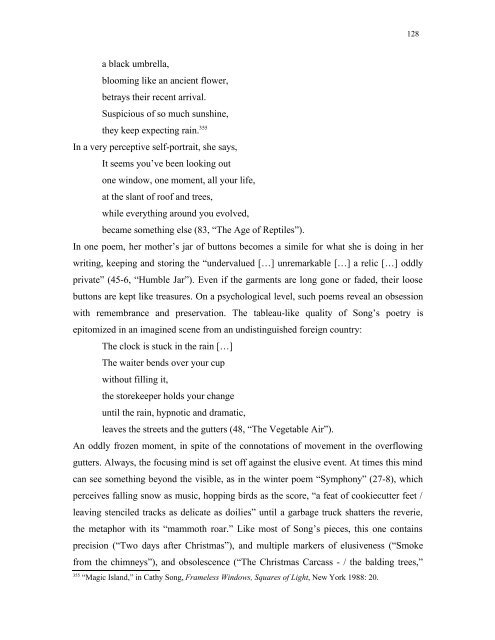A Paradise Lost - KOPS - Universität Konstanz
A Paradise Lost - KOPS - Universität Konstanz
A Paradise Lost - KOPS - Universität Konstanz
You also want an ePaper? Increase the reach of your titles
YUMPU automatically turns print PDFs into web optimized ePapers that Google loves.
a black umbrella,<br />
blooming like an ancient flower,<br />
betrays their recent arrival.<br />
Suspicious of so much sunshine,<br />
they keep expecting rain. 355<br />
In a very perceptive self-portrait, she says,<br />
It seems you’ve been looking out<br />
one window, one moment, all your life,<br />
at the slant of roof and trees,<br />
while everything around you evolved,<br />
became something else (83, “The Age of Reptiles”).<br />
In one poem, her mother’s jar of buttons becomes a simile for what she is doing in her<br />
writing, keeping and storing the “undervalued […] unremarkable […] a relic […] oddly<br />
private” (45-6, “Humble Jar”). Even if the garments are long gone or faded, their loose<br />
buttons are kept like treasures. On a psychological level, such poems reveal an obsession<br />
with remembrance and preservation. The tableau-like quality of Song’s poetry is<br />
epitomized in an imagined scene from an undistinguished foreign country:<br />
The clock is stuck in the rain […]<br />
The waiter bends over your cup<br />
without filling it,<br />
the storekeeper holds your change<br />
until the rain, hypnotic and dramatic,<br />
leaves the streets and the gutters (48, “The Vegetable Air”).<br />
An oddly frozen moment, in spite of the connotations of movement in the overflowing<br />
gutters. Always, the focusing mind is set off against the elusive event. At times this mind<br />
can see something beyond the visible, as in the winter poem “Symphony” (27-8), which<br />
perceives falling snow as music, hopping birds as the score, “a feat of cookiecutter feet /<br />
leaving stenciled tracks as delicate as doilies” until a garbage truck shatters the reverie,<br />
the metaphor with its “mammoth roar.” Like most of Song’s pieces, this one contains<br />
precision (“Two days after Christmas”), and multiple markers of elusiveness (“Smoke<br />
from the chimneys”), and obsolescence (“The Christmas Carcass - / the balding trees,”<br />
355 “Magic Island,” in Cathy Song, Frameless Windows, Squares of Light, New York 1988: 20.<br />
128

















